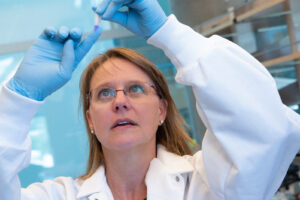 Blood clotting prevents excessive bleeding, and large cells known as megakaryocytes are a vital ingredient to ensure that clotting happens. Megakaryocytes are a rare population of cells that develop in the bone marrow and produce platelets, cell fragments that bind together to form clots when there are damaged blood vessels.
Blood clotting prevents excessive bleeding, and large cells known as megakaryocytes are a vital ingredient to ensure that clotting happens. Megakaryocytes are a rare population of cells that develop in the bone marrow and produce platelets, cell fragments that bind together to form clots when there are damaged blood vessels.
But some people such as chemotherapy patients or those born with certain conditions that produce lower platelet counts need help from blood transfusions. And that requires blood donations of which there is a global shortage also hampered by the current COVID-19 pandemic.
University of Utah biomedical engineering assistant professor Tara Deans has discovered a simple way to isolate and enrich a rare population of immature megakaryocytes, known as megakaryocyte repopulating progenitor cells, that continue to divide as they develop into mature platelet-producing cells. Her research was published in an article in the newest issue of Scientific Reports. You can read the paper here.
A challenge in studying megakaryocytes and their associated diseases is the identification, classification, and enrichment of megakaryocyte progenitor cells that are produced during the production of blood cells and platelets.
To identify this elusive cell type, her doctoral students, Lucas Bush and Connor Healy, have teamed up to combine experimental approaches with mathematics to identify unique characteristics of these cells as they develop. Using mathematical models to analyze data acquired by a technique called image flow cytometry – where the proteins expressed on the surface of a cell are intrinsically coupled with morphological features like size, shape, and texture – Bush and Healy established a method to identify, isolate, and expand this cell population in a Petri dish.
Deans hopes this research will allow her lab to better understand the processes associated with megakaryocyte development which could lead to diagnosing diseases more quickly. Ultimately, the goal of the lab is to alleviate the need for platelets donations in the future by producing viable platelets for transfusion in a dish.
“Identifying rare megakaryocyte progenitor cells will help us determine precisely when and why things go wrong in diseases that affect platelets” Deans said. “We hope to use this knowledge to help patients with cancer, heart disease, and other blood disorders.”
